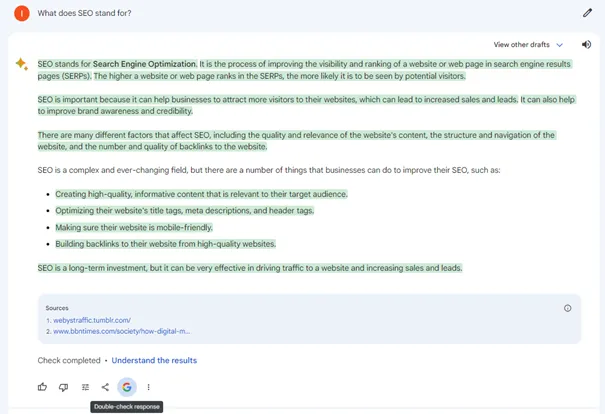Autumn has arrived, and with it, a whole host of search changes! From increased control over how AI accesses your content to further developments in the Search Generative Experience, September proves to be yet another exciting month of updates.
Oh, and we can’t go on without a special mention to Google’s 25th birthday! Yes, Google has been changing both the tech industry and our everyday lives for a quarter of a century (feel old yet?). Don’t despair – read on to discover the search changes you need to know about this month.
Google’s September Helpful Content Update
On the 14th of September, Google began rolling out the September 2023 Helpful Content Update, finally finishing on the 28th of September.
The Google Helpful Content System is designed to reward content that aids user experience, providing, you guessed it, genuinely useful content to the user! Google updates this system periodically to feed into its ranking systems, cracking down on poor content, and in this update’s case, third-party content hosted on subdomains.
However, there’s something particularly interesting about September’s update. It’s only subtle, see if you can tell…


Yep, instead of content written by people, for people, Google is now looking for content written for people. While only a subtle change, it’s had a big impact on those in the SEO industry. This tiny change in wording confirms one thing: Google is loosening its grip on AI-generated content. Where this leaves the future of human-lead content is left to be seen, but one this is for sure, AI is only becoming more prevalent in the world of search.
If you’re producing genuinely helpful content (and we hope you are!), then you should have nothing to worry about. Be sure to stay tuned for more updates…
Want to Block Bard from Your Site? Robots.txt to the Rescue

Don’t want Bard to access your site’s content but not sure how to stop it? Well, wonder no more. Google’s latest announcement is one of particular interest to those technical SEO nerds out there, revealing just how you can stop Bard from accessing your site.
The answer? Disallowing the new Google crawler, aka Google-Extended, from using your content via your robots.txt file.
Separate from Googlebot (Google’s main crawler), Google-Extended will crawl your site to help the likes of Bard and Vertex AI. While you may not see the problem with allowing bots to access your site in order to aid AI, others might. So, if you want to keep your content out of Bard’s system, then all you have to do is disallow Google-Extended in your robots.txt file.
Oh, and don’t worry, this won’t impact Googlebot’s ability to crawl and index your site. It’s a completely separate user-agent.
Decision Made: Search Generative Experience to Source Links in its Answers

Still in its experiment phase in Google Labs, we’ve seen lots of change when it comes to Google’s future model of search, so we’re constantly awaiting the next Search Generative Experience update here at MRS. And September certainly didn’t disappoint!
After testing three different formats for links, likely in response to negative feedback, Google has officially made the decision to go with arrow-down buttons that reveal links to web pages as cards – within its answers! This places source links prominently in the generative search results, allowing users to easily access the original sources for the AI-generated result.
Why does it matter? Well, it’s much more than a UX decision that’s for sure. A huge concern in the industry, and to many people using AI tools such as ChatGPT or Bard, is the ethics and practicalities of sourcing when it comes to artificial intelligence. Whether it’s to prevent inadvertent plagiarism – protecting the original content creators, or to check the validity of sources, transparent sourcing is vital.
From an organic performance perspective, this also brings Search Generative Experience answers a bit more in line with existing featured snippets – meaning the user now has the choice to explore the sourced site further by clicking onto it.
“Google it!” – Google Search Can Now Double Check Bard
We know, another AI story. But trust us, this is an interesting development.
On the 19th of September, Google announced increased interconnectivity across its services, with the most interesting development being its latest cross-referencing tool: Google it.
That age old phrase we all know and love has now become a useful tool, which according to Google, can be used to “double-check Bard’s answers and expanded features to more places”.
Not convinced Bard’s response to your question is up to scratch? Bard’s ‘Google it’ button will ‘read the response and evaluate whether there is content across the web to substantiate it’. Put simply, Google’s AI is using Google Search to double-check its own validity.
We put this to the test to see what it would look like:

Running the Google Search feature confirmed that Bard’s answer to ‘What does SEO stand for?’ was in line with other sources, highlighting parts of its response with similar content it found from the search results.
Our verdict? This new feature is doing one of two things: providing the user with peace of mind to double-check a machine’s answer, and yet another step towards increased sourcing in generative AI.
Want to Stay Ahead of Search News and the Rankings?
If you’re keeping up to date with the latest and greatest from MRS Digital, then you’ll know we can help you climb the search results. Get in touch to discover how our SEO experts can help you do just that in the growing AI world.






